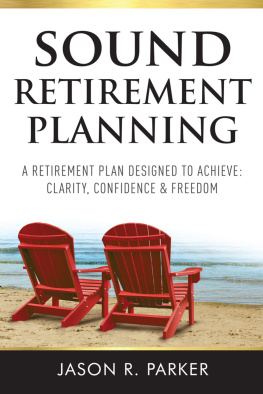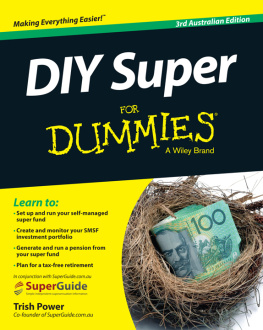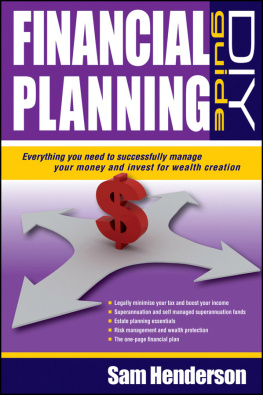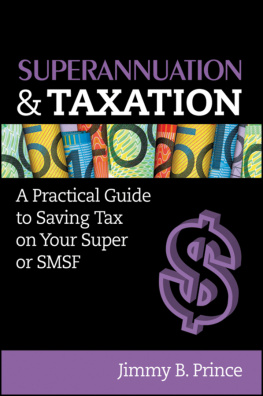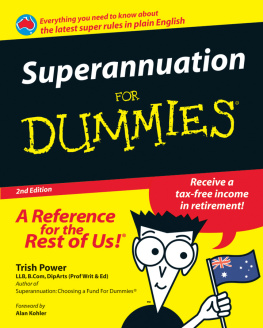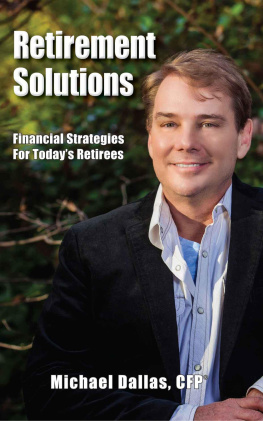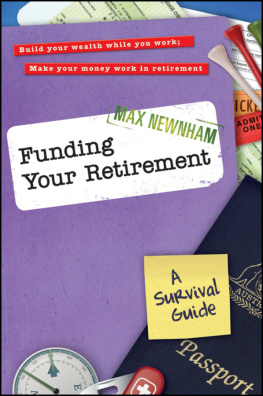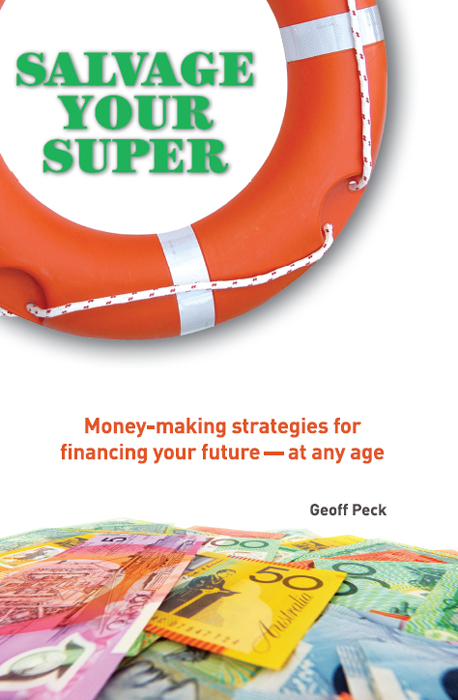Contents

First published 2009 by Wrightbooks
an imprint of John Wiley & Sons Australia, Ltd
42 McDougall Street, Milton Qld 4064
Office also in Melbourne
Geoff Peck 2009
The moral rights of the author have been asserted
National Library of Australia Cataloguing-in-Publication entry:
Author: Peck, Geoff.
Title: Salvage your super: Money-making strategies for financing your futureat any age / Geoff Peck.
ISBN: 9781742169477 (pbk.)
Notes: Includes index.
Subjects: Finance, PersonalAustralia.
Finance, PersonalPlanning.
Saving and investmentAustralia.
StocksAustralia.
InvestmentsAustralia.
Dewey Number: 332.0240994
All rights reserved. Except as permitted under the Australian Copyright Act 1968 (for example, a fair dealing for the purposes of study, research, criticism or review), no part of this book may be reproduced, stored in a retrieval system, communicated or transmitted in any form or by any means without prior written permission. All inquiries should be made to the publisher at the address above.
Cover design by Studio 131
Cover images iStockphoto.com/hidesy and iStockphoto.com/LPETTET .
Disclaimer
The material in this publication is of the nature of general comment only, and does not represent professional advice. It is not intended to provide specific guidance for particular circumstances and it should not be relied on as the basis for any decision to take action or not take action on any matter which it covers. Readers should obtain professional advice where appropriate, before making any such decision. To the maximum extent permitted by law, the author and publisher disclaim all responsibility and liability to any person, arising directly or indirectly from any person taking or not taking action based upon the information in this publication.
About the author
Geoff Peck has worked in the Australian superannuation industry since 1985. In that time he has held senior roles in product development, administration, distribution and general management, culminating in the role of Head of Superannuation Solutions for BT Financial Group, which manages superannuation and pension assets of more than $14 billion.
Geoff has extensive experience in all areas of superannuation, life insurance and investment and is committed to helping people to better understand their superannuation arrangements and thereby maximise its value.
Geoff retired from full-time work in 2006 to spend more time with his young children and be actively involved in the most fun part of their upbringing. Recently relocated to a seaside town on the far north coast of New South Wales, Geoff now has a role as a non-executive director for a life insurance company and is an active campaigner for the Smith Familys financial literacy program.
Acknowledgements
Throughout this book I have used data and charts that have been provided by some good friends within the superannuation industry: Warren Chant and Andrea West from ChantWest Financial Services; Michael Rice from Rice Warner; Linda Elkins from Russell Investments; Nicolette Rubinsztein from Colonial First State; and Michaela Mc-Glynn and Chris Caton from BT Financial Group. I would like to thank all of them for the help and support that they have provided.
Special thanks must also go to Melinda Howes for all of her great suggestions on the early drafts and to Mary Masters for helping me through the process of writing this book.
Preface
This is a little book about super, but more importantly it is a book about super that has been written after one of the most disastrous periods for investment markets. The Global Financial Crisis will have after-effects that take years to work through our investments and this event has had an important impact on our superannuation balances.
This book should be able to help make some sense of those impacts, and also help with some strategies to get your super working again. If you were lucky enough not to have been affected by the Global Financial Crisis, there are some great ideas on how to capitalise on opportunities that have been created as a result of investment markets being revalued.
While 2008 was important in many ways, it is a year that should also be thought of as simply part of the investment cycle. There is good news here as well as some telling lessons. My own situation and experience has some bearing on why this book was written. I have worked for over 20 years in the superannuation industry and I retired from full-time work in 2006. Prior to retiring I was the Head of Superannuation for BT Financial Groupone of the largest providers of superannuation and investment products in the country. I now work part time as a non-executive director of a life insurance company while bringing up my two young children.
As an expert in superannuation, my challenge will be to keep the simple core messages in plain sight. As a warning for any superannuation experts reading this book, there are areas of complexity that I have purposely avoided or ignored because they simply add no value to the non-experts ability to manage their super better. My goal is to help non-experts take an interest and manage their super in a fundamentally better way.
Like many Australians, I felt very comfortable about my financial situation in the lead up to the events of 2008. My superannuation and other investments had done incredibly well over the previous years, to the point where I could retire early. Being a fundamental believer in long-term investment strategies, I didnt changemy investments as 2008 unfolded. I stayed fully committed to sharesand rode the train down into the valley of doom.
I see myself in that group of Australians in the middle of their working lives. My wife and I are still at least 15 to 20 years away from full retirement. We had children late in our lives and they will be dependent on us for the same periodmaybe even longer.
My parents are in their mid 70s. While they receive a part Age Pension they are heavily reliant on their self funded superannuation pension. As a result of 2008 they have recently experienced real stress over their financial security. My wifes parents are in their mid 60s and were thinking about how to retire. Their decisions were also affected by the events of 2008. In both cases they found ways to deal with these events.
I also look at people starting out in their careers. There are good reasons why people in their 20s and 30s shouldnt be worried about what happened in 2008, and in fact this has created some fantastic opportunities for them.
The concerns and issues of all of these groups will be addressed within the strategies described in this book. The case studies are realistic because they deal with the real life issues that I know are affecting people in different age groups.
Introduction to the wonderful world of superannuation
As this is a book about how to save your superannuation, it is worth spending a little bit of time on why your superannuation is worth saving.
Superannuation is one of the most broadly used ways of investing money in Australia and yet remains one of the most misunderstood. Almost every working Australian has at least one superannuation account. Unfortunately many Australians have farmore than one superannuation account, and this is a clear indicator of how poorly managed our superannuation assets are.
Superannuation is an incredibly complicated animal if you want to become an expert, but at its core is something that is really quite simple: superannuation is a low-taxed investment.


